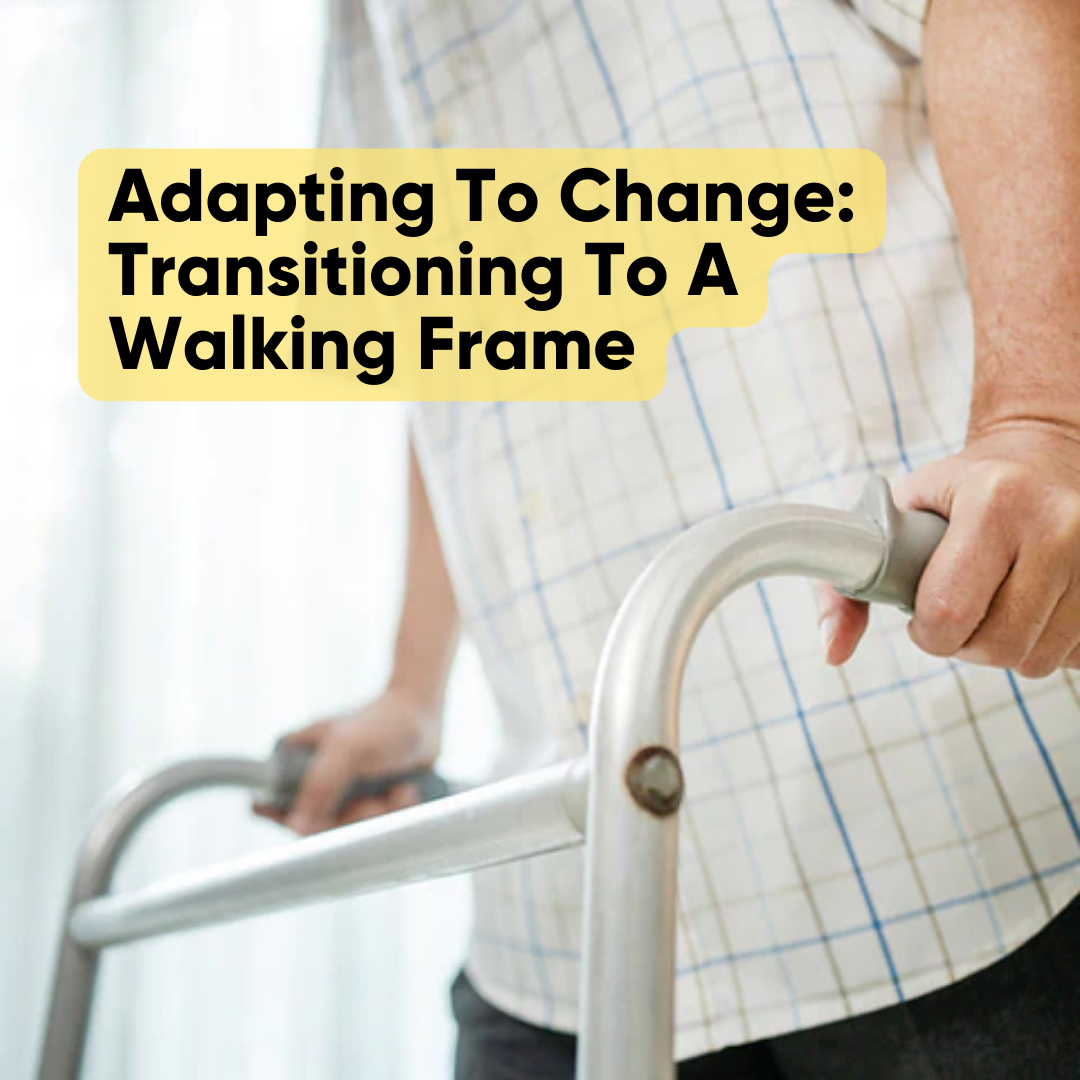Free SG local shipping for orders over $150. Express shipping options also available.
Menu
-
- Bestsellers
-
Mobility
-
Bathroom
-
Bedroom
-
Daily Living
-
About Us
-
- +65-8657-1657
- Contact Us
- Testimonials
- Product Reviews
- FAQs
- Login

Free SG local shipping for orders over $150. Express shipping options also available.
Add description, images, menus and links to your mega menu
A column with no settings can be used as a spacer
Link to your collections, sales and even external links
Add up to five columns
Add description, images, menus and links to your mega menu
A column with no settings can be used as a spacer
Link to your collections, sales and even external links
Add up to five columns
Adapting To Change: Transitioning To A Walking Frame
March 19, 2024 3 min read

Caring for an elderly loved one often involves navigating through transitions, each presenting unique challenges and opportunities for growth. As caregivers, supporting our loved ones through changes in mobility can be both emotionally and practically demanding. Transitioning to use a walking frame signifies a significant step towards maintaining independence and enhancing the quality of life for our elderly relatives.
In this article, we explore how caregivers can help their loved ones adapt to this change with confidence and compassion.
Understanding the importance of transition
As caregivers, recognising the evolving mobility needs of our elderly loved ones is paramount. Whether due to ageing, illness, or injury, changes in mobility can significantly impact their daily lives. For those who require more walking support, using a walking frame is a proactive step towards addressing these challenges and enabling our loved ones to navigate their surroundings safely and independently. By acknowledging the need for assistance, caregivers play a vital role in supporting their loved ones' transition.
Empowering independence through assistive equipment
Using a walking frame is not merely about providing physical support; it's about empowering our loved ones to maintain a sense of independence and dignity. As caregivers, we must encourage our loved ones to view assistive devices as tools that enable rather than restrict. By fostering a positive attitude towards the use of a walking frame, we can help our loved ones embrace their newfound mobility and regain a sense of control over their lives.
Navigating the transition journey together
Transitioning to a walking frame requires patience, understanding, and collaboration between caregivers and their loved ones. As caregivers, we must provide emotional support and reassurance throughout this process, acknowledging our loved ones' feelings of uncertainty and apprehension. Engaging in open communication and involving our loved ones in decision-making can help alleviate their anxieties and foster a sense of ownership over the transition journey.
Providing practical assistance and guidance
In addition to supporting our loved ones emotionally, caregivers can offer practical assistance in acquiring and using a walking frame. Researching and selecting the most suitable equipment, ensuring proper fitting, and facilitating training on safe usage are essential aspects of caregiving during this transition. Collaborating with physiotherapists and occupational therapists can provide valuable insights and guidance tailored to our loved ones' specific needs.
Addressing emotional needs and coping strategies
Transitioning to using a walking frame can evoke a range of emotions for our elderly loved ones, including embarrassment, frustration, fear, and loss of independence. As caregivers, we can create a supportive environment where our loved ones feel heard, understood, and validated. Encouraging them to express their feelings, offering reassurance, and exploring coping strategies together can help alleviate emotional distress and foster resilience throughout the transition process.
Celebrating milestones and progress
Amidst the challenges of transition, it's important for caregivers to celebrate their loved ones' milestones and accomplishments. Whether it's taking the first steps with a walking frame or mastering a new technique, acknowledging these achievements fosters a sense of pride and motivation. By focusing on progress rather than perfection, caregivers can instil confidence and optimism in their loved ones as they navigate the journey towards greater mobility and independence.
Conclusion
Transitioning to a walking frame or any mobility assistive device is a significant milestone in the journey of caregiving, marking a pivotal moment of adaptation and empowerment for our elderly loved ones. As caregivers, our role extends beyond providing physical assistance; it encompasses emotional support, practical guidance, and positive affirmation.
At The Golden Concepts, we curate a wide range of eldercare equipment to enable our loved ones to age well. We offer comprehensive elderly assistive equipment such as lightweight detachable wheelchairs and walking frames. Feel free to view our products online or visit us at our physical showroom and contact us today to learn more.
Leave a comment
Comments will be approved before showing up.
Also in Caregiving

How to Choose the Best Lightweight Wheelchair for Elderly Parents
April 29, 2025 3 min read
Choosing the right wheelchair for an elderly parent can feel overwhelming, especially with so many options available today. A lightweight wheelchair offers greater mobility, ease of transport, and independence - key factors in enhancing your loved one’s quality of life.

